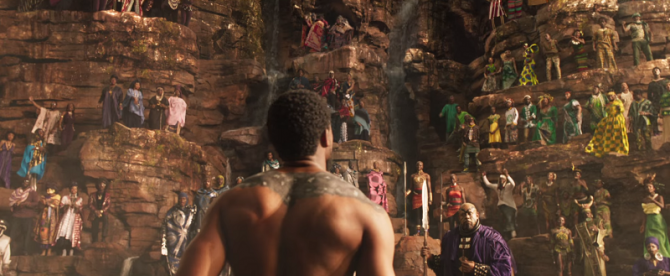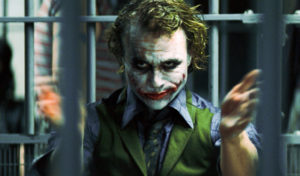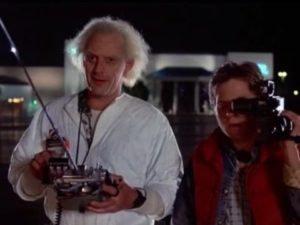All hail the king
‘Black Panther’ rules the box office
T’Challa, the Black Panther, prepares to prove himself as the king of Wakanda in ritual combat. This ritual is one of the many newly introduced concepts that make “Black Panther” stand out among other movies of the superhero genre.
February 28, 2018
It’s official, “Black Panther” is a movie that was worth the hype. The 18th film in the Marvel Cinematic Universe broke records this past weekend, telling a powerful and relevant story amidst an entirely fictional setting.
“Black Panther” grossed an estimated $202 million in North America alone on its opening weekend. It had the largest February opening weekend ever and the fifth largest opening weekend of all time.
Directed by Ryan Coogler (“Creed,” “Fruitvale Station”), “Black Panther” is being celebrated for having a mostly black cast, which is rare for superhero films and in Hollywood in general. Hopefully, this film will pave the way for future movies, ultimately resulting in colorblind casting throughout cinema. This would be the perfect scenario, but in our prejudiced and imperfect world we should recognize “Black Panther” for rejecting the status quo.
“Black Panther” introduces a beautiful new nation to the Marvel Cinematic Universe, one that is full of wonderful and complex characters. Ryan Coogler takes viewers into the heart of Wakanda, showing them its history, technology, and culture. The pacing of the film may feel a bit slow, but only because the movie juggles telling its story and introducing new things. The villain in “Black Panther” is the best in any Marvel movie to date, and every new character in the movie is a welcome addition to the MCU.
Chadwick Boseman plays T’Challa, the king of the African nation of Wakanda. T’Challa was introduced in 2016 in “Captain America: Civil War,” when his father was killed in a bombing at a United Nations conference. In the wake of his father’s death, T’Challa must ascend to the throne and lead an entire nation, making him the first superhero to do so. As a film, “Black Panther” stands apart from other superhero movies because it introduces these new concepts and takes place in an African nation rich with history and culture.

Other returning characters from the MCU include Martin Freeman’s character Everett Ross and Andy Serkis’ character Ulysses Klaue. Ross is a C.I.A. agent who was first seen in “Civil War.” He is not entirely necessary to the plot of “Black Panther,” but his character is still a welcome addition. Ulysses Klaue was introduced in “Avengers: Age of Ultron” as an arms dealer who stole Wakandan vibranium. He’s a tad bit psychotic and has a weaponized robotic arm, so he’s certainly a fun minor villain. However, he pales in comparison to the major threat of the movie, Killmonger.
In a standard superhero flick, the villain tries to end the world because he or she is born evil and the good guy saves the world because he or she is just great. In “Black Panther,” the villain has far more profound motivations and desires. Killmonger, a fierce warrior played by Michael B. Jordan, sees the racial issues in the world. He believes that to help black men and women everywhere, Wakanda should use its advanced weapons to help them rise up and kill those who oppress them. T’Challa is not blind to these same issues in the world, but he refuses to wage a global war.
What separates the two men is not their intentions, but their methods. T’Challa is the good guy because he ultimately chooses a path of peace. Killmonger chooses a path of destruction. That is the important difference.
The greatest strength of “Black Panther” is its newly introduced characters. The two best new arrivals were Okoye and Shuri. Okoye, a brutal Wakandan general, is played by Danai Gurira. Okoye leads a team of skilled female warriors called the Dora Milaje. Letitia Wright plays T’Challa’s younger sister, Shuri, who develops new weapons and technology using vibranium. In a film that introduced African culture and traditions to the MCU, Shuri rejects those traditions in favor of a more progressive mindset.
Wakanda is the most technologically advanced society on Earth because it is located on the only source of vibranium in the world. Vibranium, the same metal that Captain America’s shield is made of, has an abundance of uses, from weapons to transportation systems to the Black Panther suit. Wakanda has kept itself closed off and hidden for centuries, fearing that its advanced technology would only cause chaos amongst the rest of the world.
“Black Panther” as a film stands apart because it raises and addresses powerful questions: Is Wakanda obliged to use its resources to help struggling people in the world? More specifically, should Wakandans help impoverished black men and women? Is it T’Challa’s duty to protect black communities across the world?
The lesson to be learned from “Black Panther” is that instead of fighting to solve our society’s issues, we must work together as humans to fix them. The film holds up a mirror to the audience and asks the questions we have to ask ourselves. We have to end prejudice and racism, but how? Honest, unbiased love and compassion for each other is the best place to start. If we choose to aid those in need instead of killing those in power, we can make the world a better place, and that is something worth celebrating.








